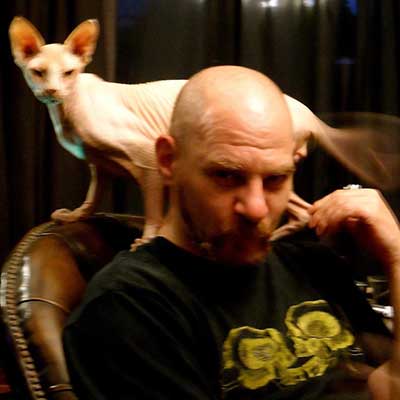The records you often find yourself living inside of – the ones that create a sensation-rich world to explore with new discoveries to be made with each return – aren’t the grand, narrative epics; they’re sprawling beasts that map out a state of mind in all its turbulent, capricious, 360° depth. Listening to Azusa’s debut album Heavy Yoke feels like crossing such a threshold. Featuring Extol guitarist and drummer Christer Espevoll and David Husvik respectively, former Dillinger Escape Plan and current John Frum bassist Liam Wilson, and vocalist Eleni Zafiriadou, from both indie act Sea + Air and the noisier Jumbo Jet, Azusa is no side-project; it’s an adventure undertaken. The handholds you will find amongst Heavy Yoke’s 34-minute run-time, from choppy, thrash-heavy riffs to Dillinger-style constantly diverted momentum, are but launch pads into jazzy-but-wired, topsy-turvy dynamics, rampant, Voivod-esque, warped perspectives, and a whole gamut of fractured emotions pouring out of Eleni’s multiple voices. It all forms a picture that’s bigger than the sum of its parts, but one that’s pressing and imperative, like a riot occurring on the periphery of your vision.
Despite the different backgrounds and experiences that came together to create Azusa, for Liam, what brought them together was a refusal to stay within comfort zones.
“I guess with Dillinger there was a danger of falling into a certain pattern,” he says. “There can be a crutch at times when you’re working with people you’ve known for 18 years. But when you’re working with people and you’re in your 30s and you all have records under your belt and you’re meeting them for the first time, there’s a different expectation, where you’re trying to get 110% out of it. When I first met the Extol guys, I thought they’re going to think I’m Satan’s child or something, and I was really caught up in what they would think of me. But it was like, ‘Oh, you guys are kindred spirits.’ Our sense of humour and where we’re coming from might not be exactly the same, but we’re a lot more similar than we are dissimilar.”
The puzzle piece that fully took Azusa into a new realm was the introduction of Eleni. Originally a friend of David’s, her smooth, dreamy vocals for Sea + Air are but one small part of the repertoire she brings to the album, switching from coquettish, almost poppy tones to full-on, throat-ripping lunges and a host of shades in between. They’re not the binary clean/growl you might find on an average metalcore album, but a kaleidoscopic display that’s part delirium, part rawly honest rifling through psychological keys to unlock the next stage of the journey.
“It was pretty clear that I would scream in Azusa,” says Eleni. “David had seen me performing with Jumbo Jet around 2004, and back then we already had that ‘bipolar’ element of clean/non-clean vocals. If Jumbo Jet was bipolar, Azusa developed a multiple personality; suddenly all those different voices forged ahead. Imagine writing a book and creating different characters. It was just too much fun to slip into different roles. I barricaded myself in my tiny recording bunker and switched my inner flashlight on to explore some unfamiliar terrain.”
For Eleni, the common, if unstable ground between her different bands is a “willingness to go to extremes, unpredictability and experimentation”, whatever the outcome.
“Sea + Air live shows were similar to a risky circus act,” she recalls. “They felt like walking on a tightrope without a safety net, and everybody’s watching you fall. Failure was part of the concept. When you blundered, the whole song was down the drain.
“For me, singing has never been about a certain technique,” she says of her willingness to approach a song from all manner of oblique yet intuitively resonant angles. “I stumbled accidentally into the world of playing music. I’m a dancer. That’s where I come from. I’m a dilettante, an uneducated musician. I don’t care about techniques. What I do care for is expression.”
For all the jazzy elements running though Heavy Yoke, the album never sounds over-indulgent, too immediate to ever fall into the kind of musical holding patterns that djent can often fall prone to. By the same token, for all the metal elements you’ll find, it effortlessly escapes their historical gravity, each a signpost to somewhere off the map.
“We tried to walk that line of making sure it didn’t sound dated,” says Liam. “It almost feels like if you don’t have a djenty type riff on your record, it sounds old. But we also don’t want to fall into the modern convention, and as an ultimate goal we were not trying to fit into a genre so much as we are trying to create a new subgenre. We were very conscious of not falling into the tyre marks that metal has created for itself; after a while that mud is so deep that you can’t even get out of it! Ha ha ha!”
Much as jazz can be seen as a dialogue between musicians, so the themes of Azusa are the attempt to find an interchange between different, often warring perspectives, be it the ones we harbour internally, or the external forces we need to navigate by, or around.
“The overarching theme of the record is about those invisible relationships,” muses Liam, “like between you and God, by whatever terms you define that, or between and your shadow self, you and your partner, whether it’s your bandmate, lover or whatever, and the fluidity of those feelings. That’s the sphere that I think a lot of this is coming from and also mostly a frustrated-but-there-is-a-light-at-the-end-of-the-tunnel kind of story arc. It’s very much a reflection on upbringing and where mysticism and belief play into that and how those things help get you through or potentially become the stumbling blocks in getting ahead.”
Heavy Yoke is out now.

